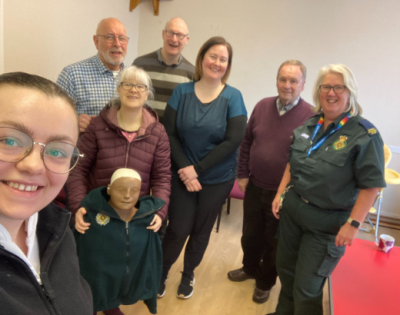
The new defibrillators have been funded by Healthy Cities following a bid from North East Ambulance Service (NEAS) to increase the number of CPAD defibrillator sites, Community First Responder schemes, and public awareness around cardiac arrest and their role in increasing the chance of survival.
The project is underway and will take place across the year, working in partnership with Sunderland City Council, North East and North Cumbria Integrated Care Board (ICB), the British Heart Foundation and the Red Sky Foundation.
The areas have been identified from data supplied by British Heart Foundation to ensure specific areas of deprivation have an accessible community defibrillator nearby. All defibrillators will be registered on The Circuit – the national defibrillator network - that enables 999 call handlers to direct bystanders to the nearest registered defibrillator.
Early recognition that someone is in cardiac arrest, early CPR and early defibrillation are first three key links in the chain of survival for anyone in cardiac arrest. CPR buys time by keeping a supply of oxygen going to the brain whilst using a defibrillator can try to get the heart back into its normal rhythm and ultimately increasing a person’s chances of survival.
Deputy Chief Operating Officer at North East Ambulance Service, Victoria Court said: “Current survival rates from cardiac arrest are around 8% in the UK but we hope to increase this through working with partner organisations to raise awareness, provide public education in how carry out CPR and increase the number of defibrillators available to the public.
Early intervention can more than double a person’s chances of survival. Any member of the public can use a defibrillator and you don’t have to be trained to use one, but knowing what it does can make things quicker in those vital seconds whilst our crews are on their way.”
Additionally, the funding will also support the creation of 10 Community First Responder schemes in Castletown, Pennywell, Farrington, Silksworth, Ryhope and Roker, with the aim of expanding into Hendon, Houghton, Easington Lane and Concorde in Washington.
Community First Responders (CFR) are volunteers employed by NEAS and are deployed to incidents at the same time as an ambulance is dispatched, to provide vital life-saving care and support, or simply a reassuring face, in the crucial minutes between a 999 call being made and the arrival of the crew.
NEAS currently has over 120 CFRs who offer around 29,000 hours of their own time to help their local communities by attending more than 1,400 incidents.
This early intervention can be lifesaving and improve the recovery outcomes for patients.
Visit the NEAS website for more information about community defibrillators: Community defibrillators :: North East Ambulance Service (neas.nhs.uk)


